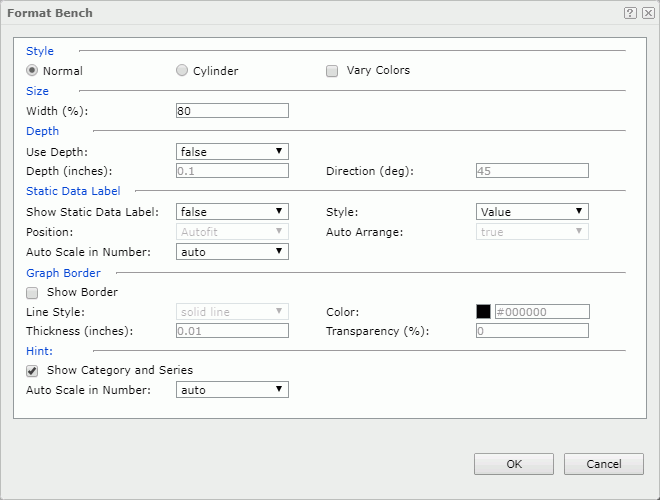Format Bench
The Format Bench dialog helps you to format the bars of a bench chart. This dialog appears when you right-click a bench chart and select Format Graph from the shortcut menu.

Style
Specifies the style of the bars in the chart.
- Normal
Specifies to make the bars be quadrate. - Cylinder
Specifies to make the bars be columned. It takes effect only when the property Use Depth is checked below. - Vary Colors
Specifies whether to make each bar of the chart take a different color schema. It takes effect only for clustered bench types and when the chart has no series field.
Size
Specifies the size of the bars in the chart.
- Width
Specifies the bar height as a percentage of the unit height.
Depth
Specifies the depth properties for bars of the chart.
- Use Depth
Specifies whether to make the bars visually three-dimensional.- Depth
Specifies the depth of the bars, in inches. - Direction
Specifies the angle of the axis along the depth of the bars, in degrees.
- Depth
Static Data Label
Specifies the properties of the static data labels on the bars.
- Show Static Data Label
Specifies whether to show the static data labels on the bars. Only when it is true can the following static data label related properties work. - Style
Specifies the display type for data values in the static data labels.- Value
Shows the value for each bar. - Percent
Shows the percentage of each bar to the total. - Value and Percent
Shows the value and the percentage for each bar.
- Value
- Position
Specifies the position of the static data labels on the bars.- Autofit
If selected, the static data labels will be displayed automatically. - Outside Top
If selected, the static data labels will be displayed on the outside top of the bars. - Inside Top
If selected, the static data labels will be displayed on the inside top of the bars. - Inside Center
If selected, the static data labels will be displayed at the inside center of the bars. - Inside Bottom
If selected, the static data labels will be displayed at the inside bottom of the bars.
- Autofit
- Auto Arrange
For a bench chart, no matter whether the value is true or false, the static data labels will be displayed horizontally at the specified position. - Auto Scale in Number
Specifies whether to automatically scale the static data labels that are of the Number data type when the label values fall into the two ranges:- When 1000 <= value < 10^15, the following quantity unit symbols of the International System of Units are used to scale the values: K (10^3), M (10^6), G (10^9), and T (10^12).
- When 0 < value < 0.001 or value >= 10^15, scientific notation is used to scale the values.
By default it is set to auto which means that the setting follows that of the chart.
Graph Border
Specifies the properties for the border of the bars.
- Show Border
Specifies whether to show the border of the bars. When it is checked, the other border properties will be enabled.- Line Style
Specifies the line style to apply to the border. - Color
Specifies the color of the border. - Thickness
Specifies the thickness of the border. - Transparency
Specifies the transparency for color of the border.
- Line Style
Hint
Specifies the properties of the data marker hint.
- Show Category and Series
Specifies whether to include the category and series values in the data marker hint. - Auto Scale in Number
Specifies whether to automatically scale the values displayed in the data marker hint that are of the Number data type when the values fall into the two ranges:- When 1000 <= value < 10^15, the following quantity unit symbols of the International System of Units are used to scale the values: K (10^3), M (10^6), G (10^9), and T (10^12).
- When 0 < value < 0.001 or value >= 10^15, scientific notation is used to scale the values.
By default it is set to auto which means that the setting follows that of the chart.
OK
Applies the changes and closes the dialog.
Cancel
Does not retain any changes and closes the dialog.

Displays the help document about this feature.

Ignores the setting and closes this dialog.
 Previous Topic
Previous Topic